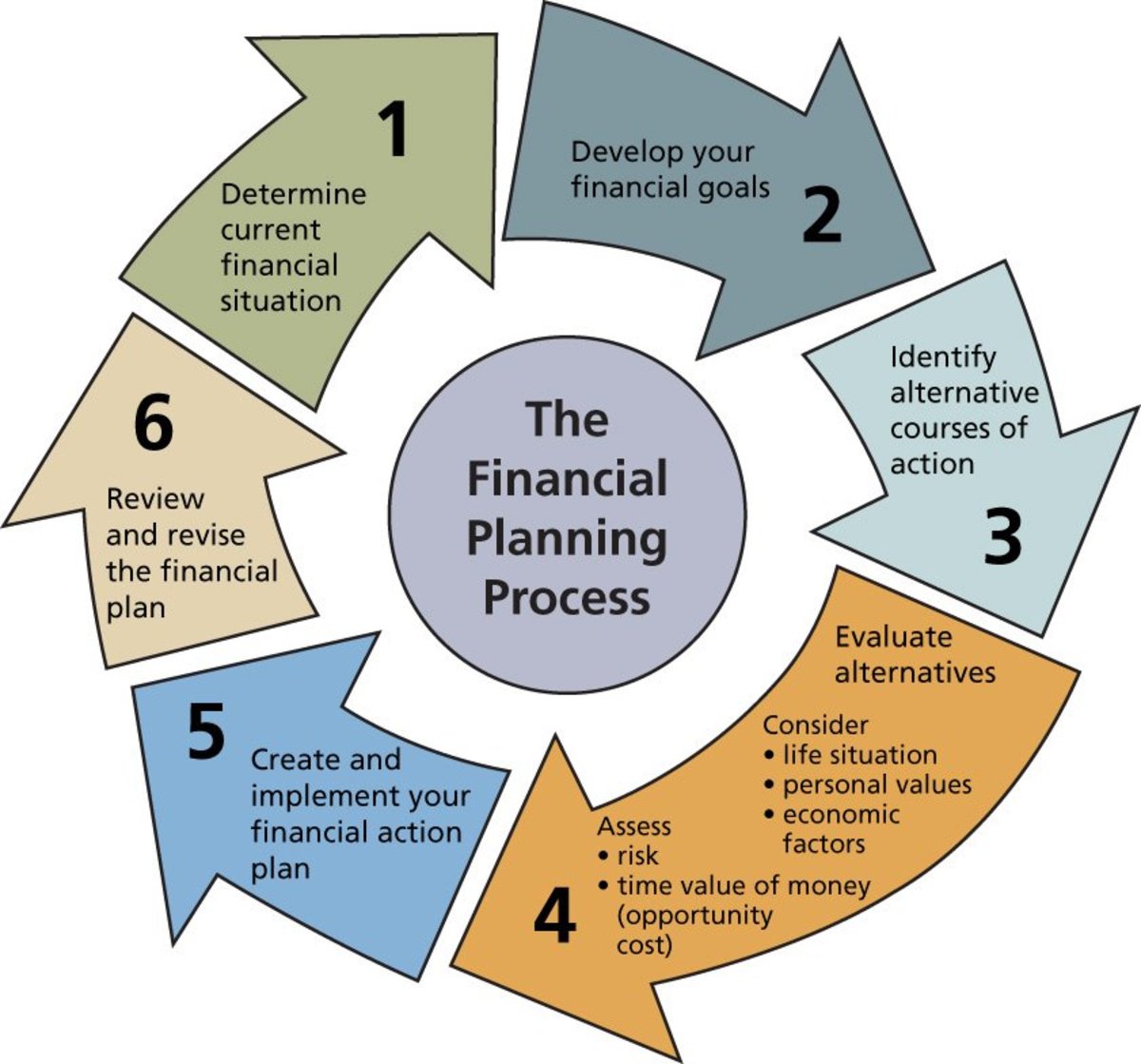Financial Planning Basics for a Wealthy Lifestyle
As I head into my 28th tax season as an accountant, I am amazed at the misconceptions people have about financial planning. I blame the misconceptions on lack of education and commissioned sales people in the investment and insurance industry.
It is difficult for young people to get an honest understanding of financial planning when their teachers don’t have a firm grasp on the subject. Financial literacy is lacking in all age groups, income brackets, and occupations. Yes, even accountants frequently are short on financial common sense.
Financial planning is defined as the accumulation and management of wealth. Wealth is any asset of value. Your job is NOT wealth. Your paycheck, once in hand, is. Management of wealth is what financial planning is all about. Financial planning and investment planning walk hand-in-hand. Commissioned sales people provide a significant proportion of the average person’s financial planning and investment knowledge. Commissioned sales people are trained to sell stuff and have a vested interest in telling you what you need to know so you invest in their products.
The amount of financial planning material out there is massive. Some is really good, some not. The best way to get a good education is to read on the subject on a regular basis. As your skills and understanding grow, so will your ability to sift the wheat from the chafe. As you study, you will get ideas to improve your financial life. This provides you with the freedom to spend your time on the things you consider most important.
Financial Planning Intro
Facets of Financial Planning
Financial planning and investment planning are kin, but not twins. Financial planning includes choosing investments, but financial planning is much more than just picking a stock, mutual fund, or putting money into a 401(k). Here are the facets of a financial plan:
- Budgeting and cash management: Manage what you have.
- Insurance for risk management: Protect what you have.
- Retirement planning: Build what you have.
- Education planning: Increase your skills.
- Tax planning: Keep more of what you earn.
- Investment planning: Make your money work harder than you.
- Estate planning: Leave a legacy.
It sounds simple when laid out so briefly. And that is the catch. Building wealth and having a lot of wealth is not hard. But it takes a plan. You must plan and you must start.
Dave Ramsey

Process of Financial Planning
Now that you know the facets of financial planning you need an action plan. The process is simple and takes only a modest amount of time.
- Identify goals and prioritize: You do not want money, you want what money buys. A million dollars will not make you happy; what a million dollars allows you to do, can.
- Examine yourself: It is helpful to gather information about yourself. You must be brutally honest about your risk tolerance, feelings about the financial planning process, and your current financial situation.
- Analyze the self examination: After reviewing your personal situation you need to arrange each issue in order of importance. Risk tolerance is less an issue while you are digging out of debt. Your excess money is used to pay down debt rather than adding to investments. Risk tolerance is still an issue for small investments like an emergency fund or the funding of a retirement account.
- Propose recommendations: Where you sit in the financial planning curve determines your personal recommendations to yourself. You need insurance if you own a home or car. If you have debt you need an action plan to pay off ALL debt in a reasonable amount of time. If you have children, college savings are a consideration. Retirement is an issue to address. What about an emergency fund? Vacation?
- Start: This is the most important part of the process. At the risk of sounding like Yogi Berra: You can’t start until you begin.
- Review: Changes to the economy, job promotion or loss, and the level of debt or investments all play a role in the regular review. Review your proposed recommendations no less than annually. As debt is paid down, investments play a bigger role. Plan future issues in advance. As you see your debt declining you need an action plan for the extra funds available. Rather than waste the opportunity (spend the money) you can plan college or retirement funding without any additional money out of the budget.
Financial Planning the Right Way
Common Mistakes in Financial Planning
- Never starting: The biggest mistake you can make is never starting. Maybe worse is building a plan and never taking action on the plan. Financial planning does not need to consume massive quantities of time. A few minutes a day, with a weekly or monthly ten minute review is all that is needed. Remember, the goal is to have the time and opportunity to do the things you want in life.
- No emergency fund: Nothing destroys a well laid financial plan than an emergency. Once I convince people to start, the biggest obstacle is the emergency fund. Three to six months of expenses is recommended in an emergency fund. If your finances are poor, save a little each week until you get $1,000 minimum in your emergency fund. The emergency fund must be in a liquid account such as a money market fund or savings account.
- Not building and following a budget: People hate budgets and I have difficulty understanding why. A budget allows you to see where you are and allows sound spending decisions with said knowledge. Can you imagine any business running without a budget? I can. They are the ones going out of business. Don’t go out of business in your personal financial life.
- Not paying yourself first: Set aside a designed percentage of all income regardless where it comes from. A nest egg is only built when the nest egg is fed.
- Not living within your means: This is the crime of the century. Stop it.
- Investing too much prior to paying down debt: Think about it. If you fund savings that throw off taxable income while you have nondeductible consumer debt you are shooting yourself in the foot. It is okay to fund retirement and college accounts. The emergency fund is also a must. But investing in mutual funds in non-retirement accounts can lead to losses or taxable income while the debt keeps grinding out interest expenses from your budget.
- Too much consumer debt: Dave Ramsey, the financial guru on several financial networks, hates debt with a passion. So do I. Want to mess up your life real bad? Dig a hole of debt. Reduce, or better yet, eliminate, consumer debt. That means credit card debt and car loans. I’ll let you keep the mortgage as long as you promise to pay it down with all due haste.
- Paying off the wrong debt first: Want to watch me pull the last three hairs off my head? Then make extra payments on your mortgage while you have credit card debt. Credit cards are more costly. Pay them off first. The mortgage gets the extra payments last.
- Not participating in employer’s retirement plan: Retirement plans are not equal. But if your employer has a 401(k) with matching, at least put aside the amount needed to max out the matching. This is called free money. The accountant in me smiles a toothy grin when thinking of free money.
- Keeping insurance deductibles too low: If your home or auto insurance has a $100 deductible, consider raising it to $500 or $1,000. The money you save on premiums can be added to the emergency fund for future losses not covered by the deductible.
- Keeping insurance liability coverage too low: A good rule of thumb is to have $1 million in liability coverage, including under- and uninsured coverage. Learn more here.
Future Value
Finally, I want to motivate you to start. Here is a future value chart. Example: If you invest $1 at 8%, at the end of ten years you will have $2.15. As you can see, the earlier you start the better.
Future Value of $1.00--Annual Compounding
Years
| 4%
| 6%
| 8%
| 10%
| 12%
| 14%
|
|---|---|---|---|---|---|---|
2
| 1.08
| 1.12
| 1.16
| 1.21
| 1.25
| 1.29
|
4
| 1.17
| 1.26
| 1.36
| 1.46
| 1.57
| 1.68
|
6
| 1.27
| 1.41
| 1.58
| 1.77
| 1.97
| 2.19
|
8
| 1.37
| 1.59
| 1.85
| 2.14
| 2.47
| 2.85
|
10
| 1.48
| 1.79
| 2.15
| 2.59
| 3.10
| 3.70
|
12
| 1.60
| 2.01
| 2.51
| 3.13
| 3.89
| 4.81
|
14
| 1.73
| 2.26
| 2.93
| 3.79
| 4.88
| 6.26
|
16
| 1.87
| 2.54
| 3.42
| 4.59
| 6.13
| 8.13
|
18
| 2.03
| 2.85
| 3.99
| 5.55
| 7.68
| 10.57
|
20
| 2.19
| 3.20
| 4.66
| 6.72
| 9.64
| 13.74
|
22
| 2.37
| 3.60
| 5.43
| 8.14
| 12.10
| 17.86
|
24
| 2.56
| 4.04
| 6.34
| 9.84
| 15.17
| 23.21
|
26
| 2.77
| 4.54
| 7.39
| 11.91
| 19.04
| 30.16
|
28
| 3.00
| 5.11
| 8.62
| 14.42
| 23.88
| 39.20
|
30
| 3.24
| 5.74
| 10.06
| 17.44
| 29.95
| 50.95
|
Now… Get ready… Set… GOOOOOOOOOO.









